Gin Osprey
£2,700.00
Description
Gin Osprey: Elevate Your XC Ambitions with Precision and Confidence
Unleashing a New Chapter in XC Excellence
For seasoned pilots who demand uncompromising glide, pinpoint handling, and unwavering confidence in active air, the Gin Osprey delivers a game-changing experience. Created to meet the evolving needs of the sport, this high-end EN C 2-liner bridges the gap between performance and safety with finesse. Whether chasing podiums or personal bests, the Osprey offers freedom, efficiency, and absolute reliability—making it the new benchmark in the XC category.
Although the Osprey shares design DNA with the Bonanza 3, its two-line layout brings forward an entirely different flight personality—one that soars in thermals, cuts through transitions, and inspires trust in turbulence. Built for serious cross-country adventurers, this wing empowers you to explore the sky with heightened awareness and minimal compromise.
Two-Liner Simplicity Meets Three-Liner Stability
While traditional EN C wings aim for balance, the Gin Osprey dares to push the envelope. With a modern 2-line architecture, it inherits glide efficiency and pitch stability typical of higher-rated wings—yet remains tame enough for experienced XC pilots moving up from a B or 3-liner C glider. It doesn’t overwhelm; rather, it harmonizes performance and control, offering a fluid, forgiving ride in dynamic air.
Intelligent Internal Structure
Engineered with optimized internal pressure and a low aspect ratio, the Osprey ensures collapse resistance and responsive feedback. Even in challenging conditions, the canopy remains composed—transmitting information subtly, not aggressively.
Shark Nose Precision
The wing’s shark nose profile guarantees consistent airflow across the chord, reducing susceptibility to stall or collapse. This aerodynamic advancement supports higher speeds and a broader usable speed range, essential for XC pilots navigating diverse terrain.wing paraglider
wing paraglider Seamless B-Control
B-riser steering on the Osprey isn’t just an afterthought—it’s an invitation to engage more deeply with your flight path. Responsive and intuitive, the riser setup ensures that bar transitions and pitch corrections feel like second nature.wing paraglider
Engineered for Everyday Epic
From the first inflation to final flare, every aspect of the Gin Osprey was fine-tuned for a pilot who doesn’t just want to fly—but aims to fly further, smarter, and safer. Its launch characteristics are simple and drama-free, even in stronger winds. Meanwhile, the wing’s collapse behavior remains docile, exhibiting low shooting or diving tendencies post-recovery.wing paraglider
Whether thermalling, gliding on bar, or dealing with unexpected turbulence, the Osprey remains your partner in progression.
Product Highlights: Why Choose the Gin Osprey?
-
✅ EN C certified 2-liner for XC pilots who value performance with passive safety
-
✅ Modern shark nose profile enhances pitch stability and stall resistance
-
✅ Optimized arc and cell count for superior glide, climb, and turn response
-
✅ Refined internal tensioning ensures feedback remains informative, not overwhelming
-
✅ Soft and intuitive B-riser control delivers confident bar-to-glide transitions
-
✅ Low aspect ratio (5.9) offers high efficiency without sacrificing security
-
✅ Light yet durable materials combine portability with strength for real-world use
-
✅ Color-coded risers and lines support quick, clear pre-flight checks
-
✅ Wide weight ranges available across sizes for versatile pilot matching
Inclusive by Design, Adventure by Nature
Regardless of where you are in your flying journey, the Gin Osprey recognizes your right to progression. It was created for ambitious pilots—not just elite racers—offering a tangible step forward for those who’ve mastered high B or C-category wings. The design accommodates different flying styles, allowing you to choose between efficiency-driven glides or dynamic thermalling depending on conditions and preference.
Whether you’re a weekend warrior eyeing big triangles or a backcountry explorer searching for new terrain, the Osprey adapts. No assumptions about gender, build, or background—just one expectation: that you’re ready to unlock your next chapter in paragliding.
Takeoff to Landing: What the Flight Feels Like
Inflation and Launch: Smooth and straightforward. The wing rises symmetrically with minimal corrections required, even in crosswind conditions.
In Flight: Agile in the core yet incredibly stable on glide. Pitch remains dampened while brake input translates into effortless directional change. You’re always in tune with the wing, never chasing it.
On Bar: Confidence builds. The Osprey maintains a solid feel even when accelerated, cutting through air masses without the typical jitteriness of high-performance gliders.
Landing: Predictable flare with generous energy retention. You’ll feel confident setting down on tight or technical LZs.
Safety Without Sacrifice
While the Osprey is performance-driven, it still passes EN C certification—meaning it handles collapses predictably and is designed with a real pilot in mind. Reinforced leading-edge structures and well-distributed internal loads contribute to high collapse resistance. Moreover, the wing’s recovery behavior in test scenarios reflects a glider that returns to equilibrium smoothly, minimizing pilot workload.
For pilots upgrading from traditional EN C wings, the Osprey offers a familiar safety feel with a huge leap in glide and bar efficiency. For former EN D pilots, it offers a surprisingly calm experience—without the penalty of underperformance.
Who Is the Gin Osprey For?
If you’ve flown mid- to high-Bs or 3-liner Cs and found yourself wishing for something more efficient—but without the volatility of a comp wing—the Gin Osprey is your calling. It caters to:
-
🧭 Cross-country pilots flying long distances across complex terrain
-
💨 Thermal hunters looking for agile and responsive core control
-
🎯 Pilots ready to step up from 3-liner EN C wings with confidence
-
🪂 Adventurers who need passive safety with peak performance
-
🏔️ Hike-and-fly enthusiasts who value lighter wings with stability
Final Thought: Redefine What You Expect from XC Flight
The Gin Osprey redefines what’s possible in the EN C category. It takes the power of a 2-liner layout and translates it into something friendly, efficient, and exhilarating. You won’t just fly XC—you’ll feel every decision, every thermal, and every moment with newfound clarity.
In a world of wings that ask you to choose between performance or peace of mind, the Osprey boldly offers both. So spread your wings, take to the skies, and let your XC story unfold—one soaring kilometer at a time.
Take Flight with Purpose: The Gin Osprey
Tailored for Tandem Pros
The Gin Osprey isn’t just another reserve—it’s a tandem reserve system engineered for professional performance, rapid deployment, and reliable recovery. Specifically designed for tandem pilots who demand trust, consistency, and control in emergency situations, the Osprey delivers when it matters most. So, whether you’re flying commercially or adventuring with friends, you can fly with absolute confidence.
Quick Openings. Stable Descents. Total Control of Gin Osprey
Because emergencies leave no room for error, the Gin Osprey is crafted to deploy fast and descend slow. In fact, thanks to its square design and advanced materials, it opens quickly and stabilizes immediately. As a result, the descent is smoother, more manageable, and remarkably controlled. Therefore, you—and your passenger—experience maximum safety during an unplanned landing.
Built to Withstand the Demands of Tandem Flying
Not only does the Gin Osprey meet the rigorous standards required for tandem use, but it exceeds them. Designed with reinforced stitching, durable yet lightweight fabrics, and optimized bridle configurations, it holds up under repeated use and in challenging conditions. And because it’s been fine-tuned for tandem dynamics, it performs predictably—no surprises, no compromise.
Compact and Efficient, Without Sacrificing Strength with Gin Osprey
Even though it’s built for two, the Gin Osprey remains surprisingly compact. So, packing and carrying it is easier than you’d expect. Yet, when it’s time to deploy, its performance speaks for itself. Additionally, its weight-to-surface-area ratio is optimized for tandem safety, ensuring strong, steady deceleration and ample lift.Ozone Alta
Certified Safety, Trusted by Pros
Certified to EN standards and tested by real-world tandem professionals, the Gin Osprey is trusted in the field—because it’s been proven in the air. Moreover, its user-friendly design ensures smooth compatibility with most harness systems. Whether you’re flying every day or keeping it ready as a backup, the Osprey integrates seamlessly into your setup.
Fly Professionally. Land Safely.
To summarize, when you choose the Gin Osprey, you choose more than a reserve—you choose a proven system of safety, speed, and strength. So, don’t leave your tandem flights to chance. Instead, equip yourself with the confidence to handle the unexpected. Because when you’re flying for two, nothing matters more than reliability.
TECHNICAL SPECIFICATIONS
| SIZE | 34 |
|---|---|
| Flat area (m2) | 34.00 |
| Flat span (m) | 12.77 |
| Flat aspect ratio | 4.8 |
| Projected area (m2) | 29.5 |
| Projected span (m) | 10.3 |
| Projected aspect ratio | 3.59 |
| Chord (m) | 3.3 |
| Number of cells | 36 |
| Glider weight (kg) | 7.1 |
| Weight range (kg) | 100-210 |
| Certification | EN B |
Easy to manage on take-off and landing
With a surface area of only 34m², the Osprey is easy to manage on take-off. Compared to a conventionally sized tandem, a greater margin of safety is possible in stronger winds. Despite the reduced area, landing remains comfortable, even in nil wind. The EPT (Equalised Pressure Technology) airfoil enables a low stall speed with good energy retention and a well-defined flare window.
genie pro max instruction manual Speed and stability
The Osprey has a wide speed range and a high maximum speed. The 11cm trimmer is uniquely long and the wing remains stable at even the highest speeds. In addition, a 2cm negative trim allows the pilot to set a lower trim speed. The glider is certified EN B across the entire weight range of 100-210kg.genie pro max instruction manual
A versatile all-rounder
The Osprey fills the gaps left by other tandems on the market. The unique design reduces the number of lines and the three riser levels make sorting of the lines straightforward. It’s also well suited for soaring in stronger winds, and its direct and responsive handling makes thermal flying a pure joy.genie pro max instruction manual
DETAILS OF Gin Osprey
- Equalized Pressure Technology (EPT)
- ‘S-inlets’ for better inflation
- 3 risers / 3 lines spanwise
- Split A risers for easy big ears
- cleat on C-riser to fix A3-line in the big ear position
- Colour-coded lines for easy identification
- Strong and durable materials
- Trailing edge mini-ribs
- three different tandem spreaders available: light, supple (soft) and rigid (hard)
- also certified as a solo wing
MATERIALS
- Canopy cloth
- Upper surface: Dominico 30D (water repellent) 41g/m²
- Lower surface: Dominico 30D (water repellent) 41g/m²
- Lines
- Upper: Liros DSL 70 / PPSL 120 / GIN TGL 80
- Middle: Liros DSL 70 / PPSL 120 / 200
- Main: Edelrid 7343-280 | 420 | Gin Gliders TGL 400https://www.instagram.com/paragliding_explorer_wing_shop?igsh=bGg2dWxqNzQ1bzF4&utm_source=qr
COLOURS of Gin Osprey

DOCUMENTS
Manual
✅ Gin Osprey – Para Test and Certification Overview
🔍 What Is a Para Test?
A Para Test refers to the official EN certification process that evaluates a paraglider’s safety, behavior, and recovery characteristics under extreme but controlled scenarios. These tests are conducted by authorized testing bodies like Air Turquoise or the DHV, using strict protocols. The results determine a wing’s classification (A, B, C, or D) based on how it behaves in induced flight incidents like collapses, stalls, and spins.
The Gin Osprey, certified to EN C, has successfully passed these rigorous trials—proving its competence and predictability across all required maneuvers.
🧪 Key Elements of the Para Test
During the EN C para test, the wing must demonstrate safe and manageable behavior across a series of standardized simulations, such as:
-
Asymmetric Collapse: The glider is deliberately folded from one side mid-flight. The Osprey’s response is to turn slowly with minimal pitch dive, followed by a smooth and controlled reopening.
-
Frontal Collapse: The front portion of the wing is collapsed symmetrically. The Osprey passed by reopening cleanly with minimal surge or energy loss.
-
Full Stall and Spin Recovery: The wing is intentionally stalled and released. The Osprey exits the stall smoothly without diving aggressively—demonstrating excellent recovery energy management.
-
Spiral Dives: Tested to ensure it doesn’t maintain a locked-in spiral. The Gin Osprey exits with minimal altitude loss and without pilot overcorrection.
-
Accelerated Collapses: The wing is collapsed at bar (in accelerated mode). The Osprey retained its control and passed with mild response and fast reinflation.
✅ How the Gin Osprey Performed
The Osprey was rated EN C across all tested categories, which means it:
-
Reacts calmly and predictably to collapses
-
Requires moderate pilot input for recovery
-
Shows no dangerous instability post-collapse
-
Maintains pitch and roll stability during active air conditions
-
Can be safely flown at full bar, with controlled reactions
These results confirm that the Gin Osprey is safe for XC pilots with proper active piloting experience.
🛡️ Safety Insights from Para Test Certification
-
The low aspect ratio (5.9) helps ensure inherent stability without sacrificing glide.
-
Line geometry and B-control systems contribute to its forgiving reactions during induced deflations.
-
The wing maintains form and structure under collapse loads—essential for safety in turbulent real-life thermals.
🧠 What This Means for You
Owning an EN C-certified two-liner like the Gin Osprey offers you the confidence of tested behavior under stress—something crucial when flying long XC routes or encountering unexpected weather shifts. Although para tests don’t replicate every real-life scenario, they give a scientific and measurable benchmark of trust in your equipment.
✈️ In Summary
The Gin Osprey’s successful para test results prove its reliability in both performance and safety. If you’re an experienced pilot looking to transition into the world of two-liners, this wing ensures that you’re not just flying faster or farther—but doing so with verified safety and pilot-friendly behavior. Always fly informed, always fly prepared—and with the Osprey, always fly secure.
🧠 Gin Osprey – Frequently Asked Questions (FAQ)
❓Who is the Gin Osprey designed for?
The Gin Osprey is specifically built for experienced XC pilots ready to step up from a high-B or traditional EN C 3-liner wing. If you’re seeking 2-liner performance with EN C certification, this wing is a natural evolution. It’s not designed for beginners but rather confident pilots comfortable in active air and familiar with thermalling, gliding, and using speed systems efficiently.
❓What certification does the Osprey have?
The Osprey is fully EN C certified, meaning it meets rigorous safety and recovery standards while offering advanced performance. It’s tested for real-world flying conditions, including asymmetric collapses, frontal deflations, and induced spins—ensuring it behaves in a controlled, recoverable way under pilot stress or turbulence.
❓What makes the Gin Osprey different from the Bonanza 3 or Leopard?
Although the Osprey shares some lineage with the Bonanza 3 in terms of structure and materials, its 2-line configuration sets it apart. Compared to the Leopard, which is an EN D 2-liner, the Osprey offers greater passive safety and a smoother learning curve. It’s built as a bridge between mid-C gliders and full-on competition wings.condor weight
❓Is the Gin Osprey a good glider for first-time 2-liner pilots?
Yes. For pilots who are experienced on 3-liner high-B or C gliders, the Osprey offers an approachable path into 2-liner flying. It retains responsive handling and bar stability without the aggressive behavior often seen in EN D wings. However, it’s still important to gain SIV experience and ensure comfort in strong thermic or turbulent environments.condor weight
❓How does it handle in thermals and transitions?
The Gin Osprey shines in both conditions. In thermals, the wing offers precise, agile turning with progressive brake response. For transitions, its glide efficiency and pitch stability under bar make it incredibly effective at covering distance—ideal for cross-country pilots. The shark nose and low aspect ratio further improve comfort during extended glides.
❓What about launch characteristics?
Launching the Osprey is simple and smooth, even in strong or crosswind scenarios. The wing rises evenly without overshooting, and light brake input ensures it stays centered. Its ease of inflation and takeoff behavior reflect Gin’s commitment to pilot-friendly performance—even in demanding launch sites.
❓Can the Osprey be used for hike-and-fly?
Absolutely. While not an ultralight glider, the Gin Osprey is constructed using lightweight yet durable materials, making it well-suited for hike-and-fly or vol-biv missions. Its pack volume and weight are manageable, especially when paired with a lightweight harness and compact rucksack setup.
❓Is B-riser control effective and intuitive?
Yes. One of the standout features of the Osprey is its B-riser steering system, which provides precise pitch and directional input while on bar. It allows confident flying during accelerated transitions and turbulent air, giving you control without needing to release the speed bar.
❓How should I pack the Gin Osprey for maximum durability?
To extend wing longevity, it’s recommended to use a concertina packing method, preserving the internal pressure rods and leading edge. Gin provides a concertina bag with the wing, which helps avoid unnecessary stress on reinforcements and keeps your glider in optimal shape for every flight.
❓What size Osprey should I choose?
Gin offers the Osprey in multiple sizes covering a broad range of weight bands. Always select a size where your in-flight weight (pilot + gear) falls in the middle of the certified weight range for optimal performance and handling. If you fly in strong alpine conditions, loading the wing slightly higher in its range can offer more stability and speed.
❓How does the Osprey behave during collapses?
During certified test conditions, the Osprey exhibits predictable and gentle behavior in asymmetric and frontal collapses. It recovers smoothly with minimal altitude loss or rotation. This passive safety profile aligns with EN C standards and reinforces confidence in active air.
❓Can I fly the Gin Osprey competitively?
Yes. While the Osprey is designed with safety and accessibility in mind, its glide performance and bar stability make it suitable for sport-class competitions, XC league flights, and distance challenges. It provides a high-performing alternative to full EN D or CCC wings for pilots who prioritize comfort and control.
❓What accessories come with the Osprey?
Each Gin Osprey comes with:
-
✅ Gin Concertina Compress Bag
-
✅ Riser twist lock
-
✅ Inner glider bag
-
✅ Compression strap
-
✅ GIN stickers and user manual
❓Where can I get support or service for my Osprey?
Gin Gliders provides global support through its international dealer network. You can contact your local authorized Gin dealer for maintenance, inspections, or advice. For detailed service schedules, refer to the user manual included with your glider, or visit www.gingliders.com.
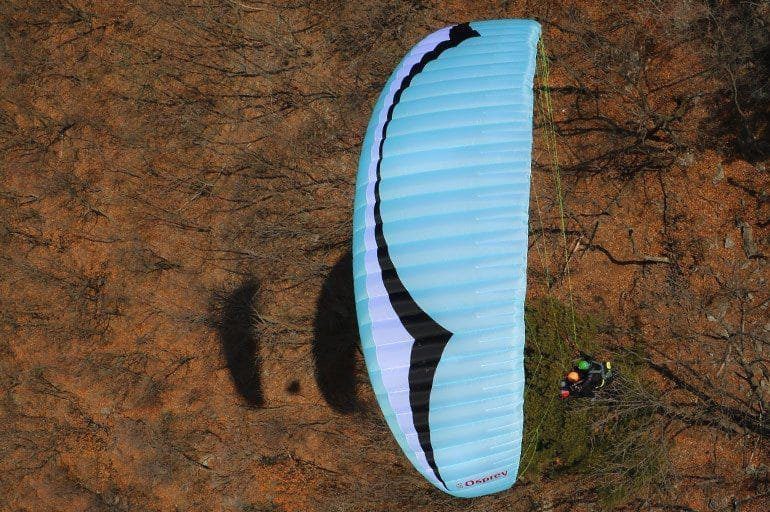
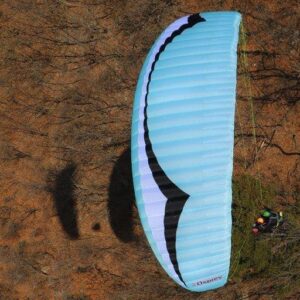
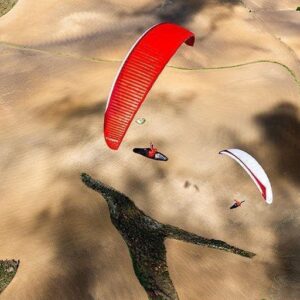
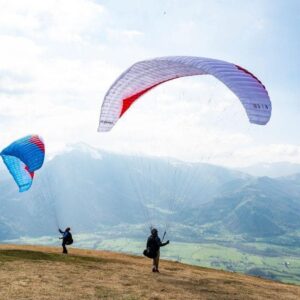
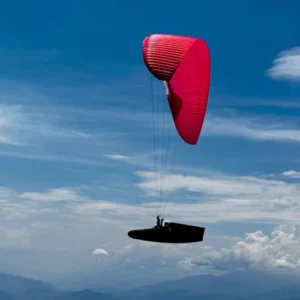
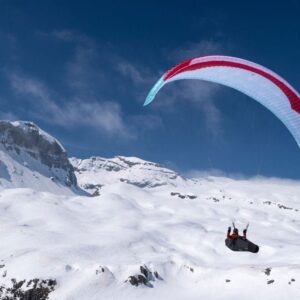
Reviews
There are no reviews yet.